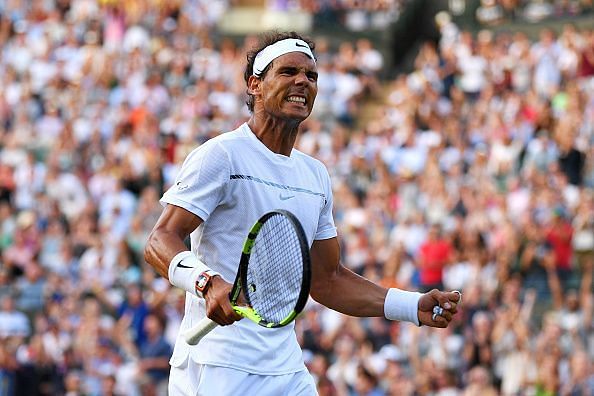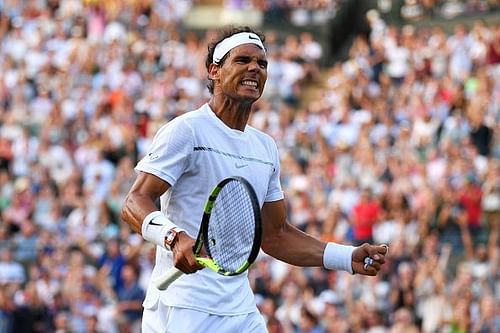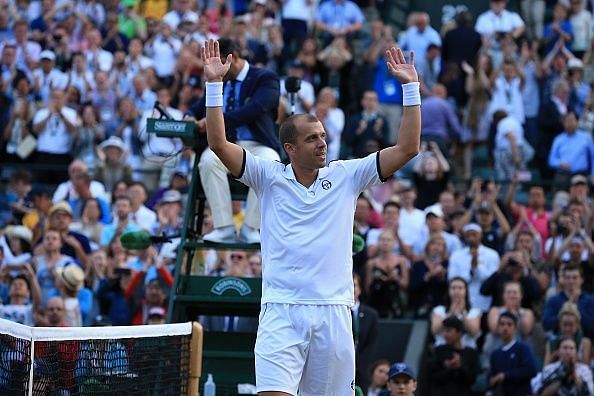
Wimbledon 2017: Rafael Nadal unleashed his beast mode, but Gilles Muller somehow found an answer to it

Rafael Nadal is often described - somewhat uncharitably, in my opinion - as a beast. There's something very visceral about his muscular playing style that prompts comparisons with beings that are single-minded and powerful in a way that humans can never be.
But while that analogy may be a little unjust (there's a distinct beauty to the Spaniard's game if you know where to look), sometimes it's hard to put it out of your mind while watching him play.
Gilles Muller seemed to have put Nadal to bed, racing away to a two-set lead in their Wimbledon fourth round match with a barrage of aces and winners. This was in keeping with the pattern of Nadal's last four Wimbledon outings; early losses to Lukas Rosol, Dustin Brown and Nick Kyrgios had told us that any player with a big serve and big groundstrokes was a mortal threat to the Spaniard on grass.
But somewhere around the middle of the third set, Nadal's demeanor changed. He started fist-pumping with more vigour and hitting his groundstrokes with more verve, and it was no surprise that the points started going in his favor. The change, however, was most noticeable on Nadal's face.
As the match went into overtime, the Spaniard looked like a man possessed. He bared his teeth and furrowed his brow, twisting his face into an animal-like snarl. His grunts during the rallies resembled the growls of a caged predator, and everyone watching knew that Nadal was ready to turn this into a long and painful slugfest.
The fifth set has been Nadal's Achilles' heel the last few years, but on this day, he seemed to have the upper hand. In the third and fourth sets Muller had been cowed into submission by Nadal's renewed power, and there was little to suggest the Luxembourg lefty would turn things around.
But while Nadal had used his passion and fiery spirit to claw his way back into the game, Muller chose the best possible moment to remember what had helped him win the first two sets: an ice-cold, almost robotic adherence to the basics.
Before the match a lot of people, including yours truly, had predicted that Muller wouldn't be the one to join the ranks of Rosol/Brown/Kyrgios, because his game was not complete enough. While he had an excellent serve, his powerful forehand was erratic, his volleys just about serviceable, and his backhand a real liability. But what if he made the absolute best out of his strengths, and played the match on his terms? Would that be sufficient to best Nadal on a surface that was tailor-made for his biggest weapons?
For a long time, there seemed to be no answer to that. The fifth set started with both men holding serve comfortably, and it was impossible to predict who would blink first. Muller's serve regained its potency from the first two sets; the down-the-T serve in the deuce court kept swerving away wickedly, giving us the rare sight of a Nadal that looked helpless and out of ideas.
But the Spaniard took care of things at his end with comparable bravado. He mixed up his serves and let his forehand rip, repeatedly forcing Muller out of position. The quality of play, as it so often does in epic matches like this, peaked in the fifth set, and every 'ooh' from the audience at a spectacular shot was followed immediately by a 'whoa' at the reply.
News of the titanic match eventually started spreading. Texts and social media posts screaming about "Nadal's epic comeback" starting doing the rounds, and soon the match was even being watched by people who had never watched a tennis match before. That's the beauty of a no-tiebreaker match, especially when it's at Wimbledon - once it goes past the normal levels of human endurance, it becomes a larger-than-life, unmissable event.
As the whole world tuned in to watch though, a pattern started emerging. Muller kept holding with ease, primarily because Nadal had retreated too far behind the baseline (he was almost level with the linesmen on some of his returns). Nadal, meanwhile, was faltering a little with his forehand, missing a few shots that he normally wouldn't.
Two match points came and went with Nadal serving at 4-5, both saved with clever first serves. But the Groundhog Day feeling was now unmistakable; Muller kept serving out wide (he had now reserved the down-the-T swinger as a change-up) and knocking off volleys, while Nadal kept going down 0-15 or 0-30 in his service games. There were mitigating circumstances, of course, which stopped the match from ending - Nadal kept holding his serve despite being under constant pressure, and he kept firing the occasional searing pass that Muller came nowhere close to touching.
Things came to a head at 9-9, with Nadal earning four break points. But Muller saved them all, with the backhand passing winner on the first one being especially memorable. The last one was saved with an ace, almost as if he was telling Nadal, "I have an invincible weapon, and I can keep using it all day."
And I have little doubt that he would have. For all the talk before the match about his supposedly one-dimensional game, Muller was a revelation in every sense of the term. He served with power and precision for the better part of 33 games, showcased hitherto-unseen touch at the net, and even stayed toe-to-toe with Nadal from the back of the court.
Many who hadn't seen him play before kept questioning, "Who is Gilles Muller, and where did he come from?". And those who had seen him before asked themselves, "Where did those groundstrokes come from, and how in freaking hell can he keep serving like that for so long?"

Ultimately, the pressure of holding Muller off while serving second in the decider proved to be too much, even for a teeth-baring, air-kicking Nadal. He hit two forehand errors to finally give up the break, and after 4 hours and 48 minutes (which, incidentally, is the same length as the 2008 Wimbledon final between Federer and Nadal), Muller had his much-deserved victory.
The 34-year-old has his work cut out in the next match, slated as he is to face a marauding Marin Cilic after just one day of rest. But it's unlikely that he's stressing about that right now; for the moment, he is the man who won when the whole world was watching. Many greats have spent their entire careers without ever experiencing something like that.
Nadal, on the other hand, couldn't hide his disappointment in his post-match press conference, saying that it's "not the result he was expecting", that he "didn't want to lose that match", and that he had "lost an opportunity". But he shouldn't be that disappointed, because in some ways, this performance was a continuation of his astonishing 2017 resurgence.
Through the claycourt season, Nadal's game was firing on all cylinders, and the result was that didn't so much as lose a set apart from that one match against Dominic Thiem in Rome. Yesterday though, his game wasn't quite there. He failed to get enough returns in play the first two sets, and overcompensated too much in the last set by standing too far back. So he ended up either giving free points to Muller, or hitting short returns that the free-swinging Luxembourgian happily put away. And all through that, the forehand kept misfiring at crucial stages, most notably his down-the-line passes in the decider; just enough of them sailed wide to help Muller retain the confidence to keep approaching the net.
Despite all that, Nadal still managed to make the match the second longest in Wimbledon history. He still fought till his arm gave out, and he still gave everyone goosebumps with his fiery determination. This was the indefatigable gladiator we had missed for much of the last three years, and which had made a brief reappearance in the Australian Open semifinal against Grigor Dimitrov earlier in the year. Nadal went to that place, and there aren't many sights in the world of sport that are better than a full-blown Rafa Roughhouse.
Which makes it all the more remarkable, then, that Muller ended up as the winner. This was one of the very few occasions in memory when Nadal sparred at his fiercest for close to five hours, and his opponent somehow found the answer to everything. Maybe it helps if you're a lefty too. Or that you have a gigantic serve. Or that you can hold your nerve when staring down an almighty 'Vamos!' from the greatest competitor the world of tennis has ever seen.
This match didn't really tell us exactly how Muller managed to keep Nadal at bay for as long as he did, or how he lived to tell the tale. But it did tell us that tennis has a place for both the animalistic and the robotic, and that when the two are pitted against each other, they can produce a rip-roaring day's play.